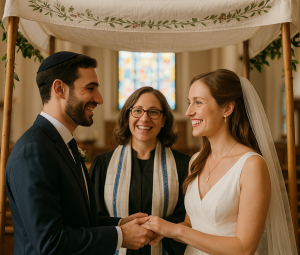 Part of the Toronto International Film Festival’s City to City program showcasing Tel Aviv on its 100th birthday, Keren Yedaya’s Jaffa is a strong family drama infused with tragedy.
Part of the Toronto International Film Festival’s City to City program showcasing Tel Aviv on its 100th birthday, Keren Yedaya’s Jaffa is a strong family drama infused with tragedy.
Ronit Elkabetz and Moni Moshonov star in the Israeli movie Jaffa playing at the TIFF.
Scheduled to be screened on Sept. 17 at 12:15 p.m. at the Varsity Cinemas, this 105-minute movie grapples deftly with a socially sensitive topic: Arab-Jewish relations in Israel, as seen through the prism of a doomed romance.
Given the fact that 20 per cent of Israel’s population consists of Muslim and Christian Arabs, as well as Druze, it’s a subject that can’t be swept under the rug.
The film, starring a stellar cast of known and unknown actors, is set in Jaffa, a mixed Arab-Jewish neighbourhood in southern Tel Aviv.
It unfolds, initially at least, in a garage owned by Reuven Wolf (Moni Moshonov), an even-tempered man whose lazy son and dutiful daughter, Meir (Roy Assaf) and Mali (Dana Ivgy), work for him as a mechanic and receptionist, respectively.
Reuven also employs two Israeli Arabs, a father and son named Hassan (Hussein Yassin Mahajne) and Tawfik (Mahmud Shalaby).
They all get along, but Meir, a surly good-for-nothing who manages to antagonize just about everyone, is the glaring exception to the rule.
Even his long-suffering mother, Osnat (Ronit Elkabetz), has grown weary and wary of Meir’s outbursts and inappropriate behaviour. At one point, in exasperation, she orders him out of the house.
Meir saves the brunt of his aggression for Tawfik, a quietly efficient mechanic of similar age. Things come to a head when Tawfik defies Meir and leaves the garage for an hour to do an errand.
What Meir and his parents do not yet know is that Tawfik and Mali, childhood sweethearts, are in love and planning to elope.
Yedaya establishes the edgy mood of the film in these early scenes and describes their secret relationship in a few revealing broad brushstrokes.
When the lovers meet at night, with the lights of Tel Aviv twinkling in the background, they embrace. But Mali, realizing that she has ventured into uncharted waters, wonders out loud whether they are making a mistake. In response, Tawfik kisses Mali tenderly, sweeping away her doubts.
Life, however, is not so simple, as Yedaya suggests.
Meir’s anger explodes in fisticuffs in a brawl with Tawfik, and the violence begets unintended and painful consequences for both families.
Mali, meanwhile, learns that she is pregnant with Tawfik’s child, a development that adds another layer of complexity to an already murky story.
Jaffa succeeds in delineating the underlying tensions and social distance between Jews and Arabs in Israel.
Israeli Arabs, though they speak Hebrew perfectly enough, are portrayed as a distinct, self-contained and culturally different minority.
Within this framework, Tawfik and Mali tread carefully, while common prejudices and fears among Jews about Arabs bubble to the surface.
Drawing a clear-eyed picture of reality in modern-day Israel, Yedaya doesn’t hold anything back.
What lifts Jaffa above the threshold of a run-of-the-mill film is its superior script and its better-than-average performances.
The storytelling is generally crisp, though there are lapses midway through, and the actors, particularly Ivgy, Assaf and Moshonov, rise to the occasion.
In short, Jaffa is a movie of which Israel’s film industry can be proud.






